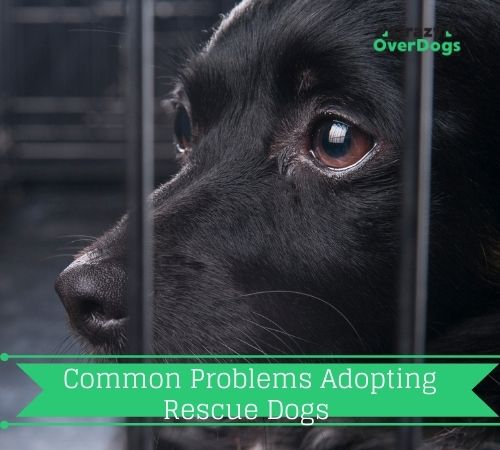It’s through the hard work of the dedicated people at rescue organizations; combined with love and patience; that will eventually help the common problems of adopting rescue dogs. Pet Rescue organizations, comprised of so many caring and dedicated people, do such great work for the abused and neglected animals that find their way to their doors.
The content takes around 5 minutes to read, but if you are in a hurry, we have also included a table of contents below so you can see at a glance what the content is.
It’s sad to see the effects of the physical and mental traumatic situations that these rescue dogs‘ have experienced. I have 3 rescue dogs and I have seen the effects, firsthand.
———————-
Also, make sure to check out today’s deals to SAVE money on dog products by clicking on the graphic below.
———————
I used to get so angry about the people who have put them in these situations. However, I have come to learn that some are given up through very genuine reasons such as ill-health or the owners have fallen on hard times.
—————–
Table Of Contents
Most Common Physical Problems:

Here is a list of the most common mental and physical problems found in rescue dogs”.
It should be stated that most dogs’ are checked out for these parasites at the shelter when they are being neutered and chipped. A new owner will be getting a dog that has been health checked.
Ticks and Fleas:
Ticks are small arachnids that engorge themselves on your pet’s blood by burying their heads in their skin. Fleas also feed off the blood and cause itching, which in extreme conditions can cause dermatitis.
Ticks, on the other paw, are small oval, dark-colored arachnids that bury their heads into your pet’s skin and engorge themselves on its blood.
Although not a serious life-threatening issue, these do need to be removed, with the proper flea treatment, for the overall health of the dog.

Intestinal Parasites:
These can be transmitted through skin contact or infected feces. The most common type are:
Hookworms: These can be very dangerous in young puppies because they feed off the puppy or dog’s blood by attaching themselves to the lower intestine.
Roundworm: These types of roundworms can grow up to 4 inches long, and feed the dogs’ food from the intestinal tract. Unfortunately, the side effect is vomiting and diarrhea.
Ringworm: This is actually a type of skin condition that is caused by a fungus. Unfortunately, it can be transmitted to other dogs or cats.
Tapeworms: dogs can get this parasite from ingesting fleas that have become infected. If you notice in the feces, rice-like segments, then I would get it checked out with the vet.
Diarrhea:
Most dogs that end up with a rescue organization, have endured a lot of stress and will be very anxious (link to article). Therefore, it is not unusual for animals to suffer from diarrhea.
In addition, it can also happen when there are changes in the diet. They are often fed food that they shouldn’t eat and as a result, are overweight and have health problems as a result.
Kennel Cough:
Kennel cough is a viral condition, which can be contagious between dogs. You can recognize it if your pet has a hacking cough, which is persistent. It can be treated and must be with antibiotics, as it could develop into pneumonia.
————————

————————-
Common Emotional Problems of Shelter Dogs:
Emotional problems in rescue dogs”, can often be more difficult to treat and I can tell you this from experience.
Most of them will be helped with love and patience, but please note that there is no magic pill. The dogs are individual as we humans.
Anxiety and Stress:
When dogs’ are abandoned or removed from their current situation to a new place, dogs can naturally experience stress and anxiety, due to new surroundings.
New people, smells, and sounds. Any human being would also experience stress if taken from familiar surroundings and dumped with unfamiliar people and places.
We have learned to be gentle and kind and patient and to notice signs like cowering and hiding, which are commonplace with our new rescue dog. The greatest help to bringing on the newbie dog is our own dogs”, which are all rescue.
————————

————————
Aggression Towards Other Dogs:
Actually, our newest foster rescue dog was showing aggression toward our own dogs. Again, I recognize this stems back to anxiety or fear. It just needs time to adjust to its new surroundings.
If you are thinking about adopting a rescue dog, then it’s a great idea to meet your new dog on neutral ground.
If you have a dog, bring it with you. Always check with the shelter or rescue organization, if you have concerns. Please remember, that giving a rescue pet a new home and a better life is a noble deed.
———————————
Please remember, that these common problems adopting rescue dogs, can be worked out, so please don’t let them put you off from adopting a dog.
————————————-
Estimated reading time: 5 minutes
——————————
Disclaimer: All material on this website is provided for your information only. It may not be construed as medical advice. No action or inaction should be taken based solely on the contents of this information. Instead, readers should consult appropriate health professionals or veterinarians on any matter relating to their pet’s health and well-being. The publisher is not responsible for errors or omissions.


